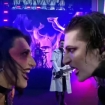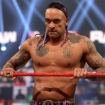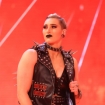Much like an underground club, WWE's NXT brand has always been a showcase for tomorrow's headliners. Be it wrestlers who've worked for years on the independent circuit building cult-like audiences, or athletes just breaking into the business, NXT puts a spotlight on figures who've yet to ascend to most viewers' main rosters. In addition to the warriors themselves, NXT has also become known for enlisting up-and-coming heavy-music groups to soundtrack their events, from Power Trip and Ghostemane providing theme songs for major matches, to Code Orange and Nita Strauss actually appearing on-camera to perform in the ring.
Metal and wrestling go together like peanut butter and jelly, but there's one man in particular who can be credited with the brand's exquisite taste for underground shredders: Paul "Triple H" Levesque, WWE's Executive Vice President of Global Talent Strategy and Development. The semi-retired wrestler is now tasked with making NXT the thrilling viewing experience that it is, from plotting how the matches themselves will unfold to choosing the theme songs for major events.
It's hard to imagine anyone else who's better suited for this position. Back in his wrestling days, Levesque was known for his own badass soundtracks, beginning with a Rage Against the Machine knock-off band that scored his D-Generation X stable, and to eventually leveling up tremendously by commissioning two original songs from the one and only Motörhead. Lemmy Kilmister and the gang actually performed Triple H's walkout song, "The Game," at Wrestlemania 17, and his close association with the metal world gave his character a hard edge that influenced many future stars to follow in his footsteps.
This Sunday June 13th, WWE is hosting NXT Takeover: In Your House, which will be soundtracked by the pop-metal powerhouse Poppy. This past week, the Grammy-nominated auteur appeared on NXT to announce her new EP, EAT (NXT Soundtrack), and she also took the time interact with a variety of wrestlers on the show, such as Triple H, Dexter Lumis and Candice LeRae. It's a logical step from having your music featured on the show to becoming a full-on performer who interacts with the roster in unexpected and exciting ways, and that's the kind of symbiotic relationship that makes NXT so special.
We spoke with Levesque about his perspective on metal, how NXT gives rising artists a platform and more.
WHEN WAS THE FIRST TIME THAT THE COMBINATION OF MUSIC AND WRESTLING STRUCK YOU?
PAUL "TRIPLE H" LEVESQUE You know, when I was a kid, music was sort of just coming into the wrestling business. Michael Hayes and the [Fabulous] Freebirds were some of the first people to bring music into their entrances. You saw World Class and WWE that would do music videos, you saw Cyndi Lauper with the Rock and Wrestling Connection. Obviously [Ric] Flair's music was immensely powerful, but what struck me even more than the entrances was when there would be music videos. Especially in the period with music videos, the right song could connect you to a performer. I think at that age I realized that music could just make you feel a certain way. In the wrestling industry, the right music can connect you to the right performer in the right event, and just make you feel more. I remember thinking as a teenager that it's why they put soundtracks in movies. It connects you to the power of the scene and what you're trying to get out of that scene.
When I started here in WWE, music was always a very important piece to me where I was as a character. When we created D-Generation X, I was very hands-on in what we wanted that music to sound and feel like. When we went from my music and the various points of it to the creation of "The Game," I wanted it to sound [such] a particular way that the music [producers] said, "We don't understand what you want it to sound like," because I kept telling them "no." I said I wanted it raw and guttural like Motörhead, and they said "Well, why don't we just see if we can get Motörhead to do it." And because I didn't know it was an option, we went and did it. I became friends with Lem from there.
So, music was always an important tie for me, and I felt like it helped establish the feel of everything. As we created NXT, the team worked heavily with me and the television production team to create musical moments, using music that connected you to the brand and made you feel a certain way. There're certain times when there's popular music that's out there that they play for me, saying, "Hey, this group really wants to be involved," and I'll say "Yeah, but the music doesn't fit the vibe." Over time, we figured out what that vibe is and how we stay true to that. That's how stuff like Poppy just works.

WRESTLING IS WHAT GOT ME INTO HEAVY METAL, I REMEMBER AS A KID BUYING THE FORCEABLE ENTRY CD AND HEARING DROWNING POOL COVER YOUR THEME. THERE WERE EVEN KIDS AT MY SCHOOL WHO WOULD HAVE THE D-X THEME ON THEIR IPOD AND NOT WATCH WRESTLING. IT WAS THIS GATEWAY FOR KIDS TO GET INTO THIS MUSIC YOU DON'T USUALLY HEAR ELSEWHERE.
Yeah, it's transformative. Lemmy and I were pretty close. I remember there being a period of time after they had done my entrance music and I was at a show of theirs in New York at Roseland [Ballroom]. We were backstage and we were walking to the front, I was going to intro them, and we were standing out by the stage when Lem said, "Look out there man. See all those young people? We had become the old dude band, all our shows were 40-year-olds and 50-year-olds. It was all the metalheads in that generation. When we did the stuff for you it changed, people heard the theme and started buying all our CDs and now these young people are coming out." I remember him telling me that, and just thinking, man, this really can connect people to something brand new. If you discover music because of something that you like, it's a cool opportunity.
WHAT WAS IT LIKE MEETING LEMMY FOR THE FIRST TIME?
He was an interesting dude. [Laughs] He was very quiet if you didn't really know him that much. The first couple of times I met him we got along fine, but it was casual conversation. I did a track for them on an album called Hammered, the track "Serial Killer." Lem asked if I'd come out to L.A., he had an idea to sync our voices together in this song. I said "Sure, I'd be honored," and we came out and they had this house above the hills. We were there for two days, Lem had put in all his bass tracks, Mikkey [Dee] was already gone and Phil [Campbell] was finishing up his guitar stuff, so the first day we were there Lem and I hung out all day.
It was a funny thing, we just sat on this couch in the living room and the whole time I was thinking, man he's the coolest dude. Obviously, there's an age difference and stuff and we talked about music for a little bit and his past. He didn't know that much about wrestling, but we talked about life. We just had this cool relationship. When time would pass, I wouldn't see him for a while, we'd phone here and there briefly. But we'd run into each other, I'd be in London, someone would tell me he was nearby, and we'd hang out for three or four hours. He came out to the Staple Center in L.A. when I would be in town, he'd watch my match and that was it. He'd sit in his limo underneath the Staple Center, wait for me to shower and all that and I'd come out and we'd sit in the limo and just talk for three or four hours. Crazy things, Billy Gibbons would walk in and talk, then Slash or somebody. [Laughs] When you were around Lemmy, all kinds of crazy things happened.
He also inspired a lot of what we're doing with NXT, he was a big advocate for youth. Dee Snider told me this story at Lemmy's funeral where if it weren't for Lem, [Twisted Sister] never would have made it. Everyone hated them, they didn't want them to get anywhere and Lem really pushed them when he didn't need to, he liked the music. It was really cool — it was just the way he was. It made me think about the music industry, and how sometimes you just need to catch breaks here and there, and it connected so strongly for us that we thought, "Maybe we could provide that, the gift of their soundtrack to our audience." Like, Poppy this week came on our show, and she's played before and done various stuff. We've got five tracks we have access to, she came in and did collaborative merch with us, released those tracks on live TV. What other platform or genre can do that?
HER APPEARANCE REALLY STRUCK ME THIS WEEK BECAUSE HER CHARACTER WAS ABLE TO MESH WITH WHAT THE TALENT ON SCREEN WAS DOING, WITH YOU AND CANDICE AND EVERYTHING. LIKE BEYOND JUST THE MUSIC APPEARING ON THE SHOW, POPPY THE CHARACTER NOW EXISTS AND INTERACTS WITH THE WRESTLERS.
Yeah, and it doesn't feel forced or like you're sticking a square peg in a round hole. Our fans can smell that from a mile away, if it's not authentic. I can tell you, I don't think Poppy knew that much about us at first. When we met for the first time she came off her bus at Full Sail, as I was walking across she had full-body pajamas on as she's walking across the parking lot. Neil, our music guy said, "She might stay fully in character today, I'm not sure." We walked over, I introduced myself and she was like "Hi, I'm Poppy," in her voice. We walked away, I looked at Neil and was like, "Yeah she's perfect for us, this is gonna work out great. [Laughs]
WHEN THE CURRENT ITERATION OF NXT WAS BEING FORMED, DID YOU KNOW FROM THE BEGINNING THAT YOU WANTED TO BRING IN UNDERGROUND ARTISTS TO MATCH UP WITH THE DEVELOPING AND UNDERGROUND TALENT? AS A WAY TO DIFFERENTIATE FROM RAW AND SMACKDOWN.
I didn't, but I always knew it had to have a different vibe and feel. If it was just another version of Raw or Smackdown, I'd already seen that. It had to be a different animal, and because it was developmental, I would make the comparison all the time that one of the things people enjoyed about it was [being into] the band before they got huge. That was cool to people, so there was always the music comparison.The thing that makes it feel the most different is the music. You go back to the Attitude Era and the music was very different to how it is today. Now they're using pop music, one minute it's Ozzy, another it's Metallica and then Bad Bunny. It's a little bit of everything but it's very pop. We need to have that edge, whether it's metal or punk. I don't pick a particular genre either — sometimes people think that's all we do — but I love finding hip-hop tracks or whatever they are. They have to fit the vibe, it has to be a little more aggressive.
I WAS AT TAKEOVER A COUPLE OF YEARS AGO IN NEW YORK AND ONE OF THE THEMES FOR THE SHOW WAS A BILLIE EILISH TRACK, AND THIS WAS RIGHT BEFORE SHE SUPERNOVA-ED. SHE WAS POP ARTIST, BUT IT WAS STILL AN AGGRESSIVE TRACK THAT MADE SENSE.
Yeah, before she took off! We used that track before it went anywhere and before it was big, and it just made sense. Poppy, too. Neil played me a track and he was like, "you might hate this but check it out," and I loved it. Now she's getting bigger and bigger. Watching her at the Grammys this year, it's awesome. Code Orange also, we put them on the show years ago when they were just starting to get there. They were going to play live, and I remember saying "Neil, I don't want to take a chance on a band playing live," sometimes you work with bands who work in the studio but it's sketchy live.
So we went to this warehouse and they played live for me, and I thought they were awesome, and they were just these kids! Now we've got this amazing relationship with them. For last year's In Your House, we reached out to see what they were doing, and they literally they rented a van when COVID was so big, they put all their gear in a U-Haul van and drove from Pittsburgh to Orlando. We did the performance when nobody was there earlier [in the day], so we spliced it together because we couldn't have that many people in the building. They set up all their own gear, they did their thing and they were gonna drive back, but were able to set up a room for them to stick around and see the show.
I GET THE SENSE NXT HAS THIS FAMILY VIBE THAT'S A LOT DIFFERENT THAN OTHER SHOWS AND BRANDS IN THIS WAY, BOTH IN THE TALENT AND THEN THE PEOPLE ADJACENT TO IT WHO SHOW UP.
Yeah. I think in our business it's that way anyway. the bigger things get, the harder it is to see that and it gets into pockets. For any band, when you're playing the club scene it's all family, and then a few years later their friends hit the stadiums and take them there, too, so it goes for any business. But it's very much a family at NXT, with the musicians, too. Nita Strauss comes all the time, and it's like coming home for her. She'll call us and see if she can come through, and she'll be there all day. It's like going to a family reunion almost, they have a blast, we have a blast. The respect is on both sides, we're appreciative of what they do and they are of what we do.
DO YOU HAVE ANY DREAM PERFORMERS FOR WWE?
Oh, Metallica. [Laughs] If we can get Metallica, it's a dream come true, if they play Wrestlemania I'll be happy. I'm constantly throwing ideas at people at every level. The bigger they get, you'd be amazed at the level of people who are like, "I'd love to do something with you guys," it's just a matter of coordinating to make things work and to get them in place. When we're three or four months out from a pay-per-view, we'll have two or three ideas on the line, sometimes they work sometimes they don't. We've got a lot of epic things. If something doesn't work, there's always the next time.
WRESTLING JUST HAS THIS STRANGE POWER OF CONNECTING PEOPLE, A LOT LIKE METAL. IN THE SAME WAY THAT WWE WAS AN INTRO FOR ME TO FIND ROB ZOMBIE AND LIMP BIZKIT, I FEEL LIKE NXT NOW CARRIES THE TORCH FOR FANS TO FIND NEW MUSIC.
When I was a kid, everyone hung out at record stores and traded tapes, it was how you found out about music. At the same time, as a kid, I was trading VHS tapes for whatever wrestling you could get. Those things always intersected for me. That genre of music always had that family vibe. It's funny, people always think that when you go see Ozzy or these heavy-metal shows, "There's going to be devil worshippers!" But it's always a family. It's a community of people who like the same thing and who want to share something. WWE is the same way.








